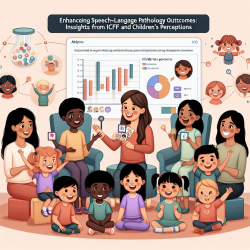The International Classification of Functioning, Disability and Health (ICF) offers a comprehensive framework that is crucial for speech-language pathologists (SLPs) aiming to understand and enhance therapeutic outcomes. Recent research titled ICF and perception of functioning according to children/adolescents in follow-up with speech/language disorders provides invaluable insights into how children and adolescents perceive changes in their speech and daily lives post-therapy. This blog will explore key findings from this study and discuss practical ways SLPs can integrate these insights into their practice.
Understanding the ICF Framework
The ICF framework, developed by the World Health Organization (WHO), promotes a shift from a purely biomedical view of health to a biopsychosocial perspective. It categorizes health and disability into four main components:
- Body Structure
- Body Functions
- Activities and Participation
- Environmental Factors
This comprehensive approach allows SLPs to consider not only the biological aspects of speech and language disorders but also their social impacts.
Key Findings from the Research
The study involved 60 children and adolescents, split into two groups: those with speech and language disorders (SLD) and those with typical development (TD). Data were collected at the beginning and six months into the follow-up period. Key findings include:
- Improvement in Body Functions: Significant positive changes were observed in articulation and fluency among the SLD group.
- Enhanced Activities and Participation: Activities such as speaking, conversing, and engaging in social relationships showed marked improvement.
- Positive Environmental Factors: Attitudes of family members and friends became more facilitative, reducing barriers to effective communication.
Practical Applications for SLPs
SLPs can leverage these findings to improve therapeutic outcomes in several ways:
- Adopt a Biopsychosocial Approach: Integrate ICF categories into all stages of therapy, from initial assessment to outcome evaluation.
- Engage Multiple Perspectives: Collect and consider feedback from children, parents, and other stakeholders to gain a holistic view of the child's progress.
- Focus on Environmental Factors: Work with families and educators to create supportive environments that facilitate better communication.
Encouraging Further Research
While this study provides a solid foundation, further research is essential to deepen our understanding of how children perceive their progress and the impact of environmental factors. Practitioners are encouraged to conduct longitudinal studies and utilize mixed-method approaches to capture both quantitative and qualitative data.
To read the original research paper, please follow this link: ICF and perception of functioning according to children/adolescents in follow-up with speech/language disorders.










